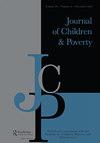Associations between parent-reported family economic hardship and mental health conditions in U.S. children
Q2 Social Sciences
引用次数: 6
Abstract
ABSTRACT This study examines the association between parent-reported family economic hardship (FEH) and child mental health conditions. We hypothesized a positive association between parent perceptions of FEH and child mental health conditions that would persist after controlling for underlying demographic and socioeconomic characteristics. Cross-sectional data came from the 2016 and 2017 National Surveys of Children's Health (NSCH), nationally representative surveys of non-institutionalized children in the United States, aged 0–17 years. We conducted chi-square as well as multivariable logistic regression analyses to investigate the relationships between FEH and internalizing disorders and behavioral/conduct problems among children ages 3–17 years. Overall, one in four children experienced FEH during their lifetime. FEH was statistically significantly (p < 0.0001) and positively correlated with each mental health condition, and the association remained after adjusting for covariates. Specifically, FEH was associated with 84% increased odds of having an internalizing disorder (OR = 1.84, 95%, CI: 1.54–2.20) and 53% increased odds of having behavioral/conduct problems (OR = 1.53, 95% CI: 1.25–1.87). Findings suggest that income alone may be an insufficient predictor of the health risks of economic hardship. Further research should examine FEH as a broader measure of disadvantage and its relationship with child health.父母报告的家庭经济困难与美国儿童心理健康状况之间的关系
摘要本研究考察了父母报告的家庭经济困难(FEH)与儿童心理健康状况之间的关系。我们假设父母对FEH的看法与儿童心理健康状况之间存在正相关关系,在控制了潜在的人口和社会经济特征后,这种关系将持续存在。横断面数据来自2016年和2017年全国儿童健康调查(NSCH),这是对美国0-17岁非收容儿童的全国代表性调查。我们进行了卡方和多变量逻辑回归分析,以调查3–17岁儿童的FEH与内化障碍和行为/行为问题之间的关系。总体而言,四分之一的儿童一生中经历过FEH。FEH具有统计学意义(p<0.0001),与每种心理健康状况呈正相关,在校正协变量后,这种相关性仍然存在。具体而言,FEH与患内化障碍的几率增加84%(OR=1.84,95%,CI:1.54-2.20)和行为/行为问题的几率增加53%(OR=1.53,95%CI:1.25-1.87)有关。研究结果表明,仅靠收入可能无法充分预测经济困难的健康风险。进一步的研究应该将FEH作为一种更广泛的劣势衡量标准及其与儿童健康的关系。
本文章由计算机程序翻译,如有差异,请以英文原文为准。
求助全文
约1分钟内获得全文
求助全文

 求助内容:
求助内容: 应助结果提醒方式:
应助结果提醒方式:


